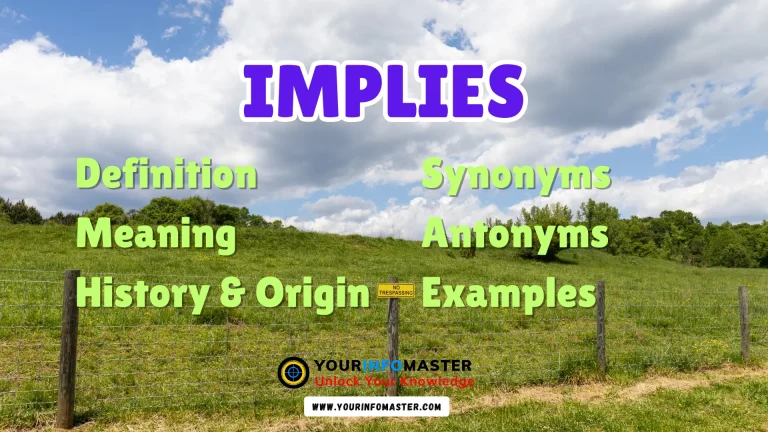In this article, I am going to explain the Spanish verb Hablar Conjugation, Hablar synonyms, Example Sentences with Hablar, Antonyms for Hablar, meaning and translation.
In the mesmerizing dance of language, the verb “hablar” takes center stage as the embodiment of communication. As one of the most fundamental verbs in Spanish, “hablar” weaves connections and bridges gaps, allowing us to convey our thoughts, emotions, and desires. Let’s delve into the captivating world of “hablar” and discover the art of expression it brings to the Spanish language.
Check also: What is another word for Discovery? | Discovery Synonyms, Antonyms and Sentences
Origin and History of Hablar
The verb “hablar” can be traced back to Latin roots, where it derived from the word “fabulari,” meaning “to talk” or “to speak.” Over the course of linguistic evolution, “hablar” became an integral part of the Spanish language, carrying the essence of human interaction.
What is the Meaning of Hablar?
In its essence, “hablar” translates to “to speak” or “to talk” in English. It serves as the medium through which individuals connect, share ideas, and build relationships.
Real-World Examples
Example 1: Hablar es la mejor forma de resolver conflictos. (Talking is the best way to resolve conflicts.)
In this sentence, “hablar” stands boldly, conveying the act of speaking as the most effective means of conflict resolution.
Example 2: ¿Hablas algún otro idioma además del español? (Do you speak any other language besides Spanish?)
Here, “hablas” shines as it inquires about the ability to speak more than one language.
List of Synonyms for Hablar
- Conversar (to converse)
- Dialogar (to dialogue)
- Platicar (to chat)
- Comunicar (to communicate)
- Charlar (to chat)
- Expresar (to express)
- Discutir (to discuss)
- Palabrear (to talk)
- Comentar (to comment)
- Conferenciar (to confer)
10 Sentences including Hablar in Spanish
- Hablar con claridad es esencial en cualquier presentación. (Speaking clearly is essential in any presentation.)
- No puedo hablar ahora, pero te llamaré más tarde. (I can’t talk now, but I’ll call you later.)
- ¿Puedes hablar más despacio, por favor? (Can you speak more slowly, please?)
- Quiero aprender a hablar francés. (I want to learn to speak French.)
- Ella habla con fluidez cuatro idiomas. (She speaks four languages fluently.)
- Es importante hablar con sinceridad en todas las relaciones. (It’s important to speak honestly in all relationships.)
- ¿Hablas en serio o estás bromeando? (Are you serious or joking?)
- Mi hermano menor acaba de aprender a hablar. (My younger brother just learned to talk.)
- No me gusta hablar en público. (I don’t like speaking in public.)
- Vamos a reunirnos para hablar sobre el proyecto. (Let’s meet to talk about the project.)
Check also: What is another word for Directly? | Directly Synonyms, Antonyms and Sentences
Hablar Present Indicative
- Yo hablo (I speak)
- Tú hablas (You speak)
- Él/Ella/Usted habla (He/She/You speak)
- Nosotros/Nosotras hablamos (We speak)
- Vosotros/Vosotras habláis (You all speak)
- Ellos/Ellas/Ustedes hablan (They/You all speak)
Hablar Preterite Indicative
- Yo hablé (I spoke)
- Tú hablaste (You spoke)
- Él/Ella/Usted habló (He/She/You spoke)
- Nosotros/Nosotras hablamos (We spoke)
- Vosotros/Vosotras hablasteis (You all spoke)
- Ellos/Ellas/Ustedes hablaron (They/You all spoke)
Hablar Imperfect Indicative
- Yo hablaba (I used to speak)
- Tú hablabas (You used to speak)
- Él/Ella/Usted hablaba (He/She/You used to speak)
- Nosotros/Nosotras hablábamos (We used to speak)
- Vosotros/Vosotras hablabais (You all used to speak)
- Ellos/Ellas/Ustedes hablaban (They/You all used to speak)
Hablar Future Indicative
- Yo hablaré (I will speak)
- Tú hablarás (You will speak)
- Él/Ella/Usted hablará (He/She/You will speak)
- Nosotros/Nosotras hablaremos (We will speak)
- Vosotros/Vosotras hablaréis (You all will speak)
- Ellos/Ellas/Ustedes hablarán (They/You all will speak)
Hablar Periphrastic Future Indicative
- Yo voy a hablar (I am going to speak)
- Tú vas a hablar (You are going to speak)
- Él/Ella/Usted va a hablar (He/She/You are going to speak)
- Nosotros/Nosotras vamos a hablar (We are going to speak)
- Vosotros/Vosotras vais a hablar (You all are going to speak)
- Ellos/Ellas/Ustedes van a hablar (They/You all are going to speak)
Hablar Conditional Indicative
- Yo hablaría (I would speak)
- Tú hablarías (You would speak)
- Él/Ella/Usted hablaría (He/She/You would speak)
- Nosotros/Nosotras hablaríamos (We would speak)
- Vosotros/Vosotras hablaríais (You all would speak)
- Ellos/Ellas/Ustedes hablarían (They/You all would speak)
Hablar Present Progressive/Gerund Form
- Yo estoy hablando (I am speaking)
- Tú estás hablando (You are speaking)
- Él/Ella/Usted está hablando (He/She/You are speaking)
- Nosotros/Nosotras estamos hablando (We are speaking)
- Vosotros/Vosotras estáis hablando (You all are speaking)
- Ellos/Ellas/Ustedes están hablando (They/You all are speaking)
Hablar Past Participle
- Hablado (spoken)
Hablar Present Subjunctive
- Que yo hable (That I speak)
- Que tú hables (That you speak)
- Que él/ella/usted hable (That he/she/you speak)
- Que nosotros/nosotras hablemos (That we speak)
- Que vosotros/vosotras habléis (That you all speak)
- Que ellos/ellas/ustedes hablen (That they/you all speak)
Hablar Imperfect Subjunctive
- Que yo hablara (That I spoke)
- Que tú hablaras (That you spoke)
- Que él/ella/usted hablara (That he/she/you spoke)
- Que nosotros/nosotras habláramos (That we spoke)
- Que vosotros/vosotras hablarais (That you all spoke)
- Que ellos/ellas/ustedes hablaran (That they/you all spoke)
Check also: What is another word for Delicate? | Delicate Synonyms, Antonyms and Sentences
Hablar Imperative
- Habla (Speak – singular)
- No hables (Don’t speak – singular)
- Hable (Speak – formal singular)
- No hable (Don’t speak – formal singular)
- Hablemos (Let’s speak)
- No hablemos (Let’s not speak)
- Hablad (Speak – plural)
- No habléis (Don’t speak – plural)
- Hablen (Speak – formal plural)
- No hablen (Don’t speak – formal plural)
Conclusion
In conclusion, the verb “hablar” stands tall as a powerful tool for communication in the Spanish language. From its humble origins to its widespread use today, “hablar” continues to be the essence of human connection and expression. As you venture further into your Spanish language journey, embrace the art of “hablar,” and discover the beauty of sharing thoughts, feelings, and ideas with others. Let “hablar” be your guide to unlocking the full potential of language and connecting with the world around you. ¡Hablemos! (Let’s speak!)
If you really enjoyed the article about “Spanish Verb Hablar Conjugation,” then I would be very grateful if you’d help it spread by emailing it to your friends or sharing it on Twitter, Instagram, or Facebook. Thank you!
Have you read “Example Sentences with Hablar?” Which of these blogs are you reading, and how is it similar to one of them?
Read More
- Spanish Verb Haber Conjugation, Meaning, Translation, Examples
- What is another word for Deny? | Deny Synonyms, Antonyms and Sentences
- What is another word for Defend? | Defend Synonyms, Antonyms and Sentences
- What is another word for Distribute? | Distribute Synonyms, Antonyms and Sentences
- What is another word for Discourage? | Discourage Synonyms, Antonyms and Sentences
- What is another word for Destiny? | Destiny Synonyms, Antonyms and Sentences
- What is another word for Desirable? | Desirable Synonyms, Antonyms and Sentences
- What is another word for Dependent? | Dependent Synonyms, Antonyms and Sentences
- What is another word for Delivery? | Delivery Synonyms, Antonyms and Sentences
- What is another word for Dance? | Dance Synonyms, Antonyms and Sentences
- What is another word for Drama? | Drama Synonyms, Antonyms and Sentences
- One Syllable Girl Names | Syllable Words
- What is another word for Disaster? | Disaster Synonyms, Antonyms and Sentences
- What is another word for Disappear? | Disappear Synonyms, Antonyms and Sentences
- What is another word for Deserve? | Deserve Synonyms, Antonyms and Sentences
- What is another word for Delight? |Delight Synonyms, Antonyms and Sentences
- What is another word for Declare? | Declare Synonyms, Antonyms and Sentences







